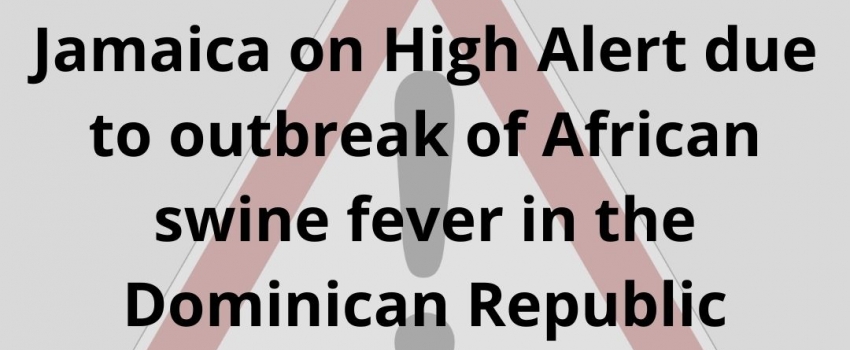You are here
Home | Jamaica on High Alert due to outbreak of African swine fever in the Dominican Republic

Jamaica has been placed on high alert for African swine fever, following a United States Department of Agriculture (USDA) report of July 28, 2021 confirming African swine fever (ASF) in samples collected from pigs in the Dominican Republic.
Through its Veterinary Services Division, the Ministry of Agriculture and Fisheries will immediately heighten collaboration with the Jamaica Customs Agency, the JDF Coast Guard, the Passport Immigration, Citizenship Agency, pig farmers and all Jamaicans in order to minimize the risk of entry of this devastating disease.
African swine fever is a devastating, economically significant and highly contagious viral disease of domestic pigs (Sus scrofa domesticus) and feral swine (Sus scrofa ferus), causing high mortality approaching 100%. While not known known to affect humans, it is almost always fatal in pigs.
The African swine fever virus is highly stable under extreme environmental conditions and is easily spread by infected swine, contaminated pork products and fomites and also via the soft tick (Ornithodoros) vector.
Introduction of the virus into the country may occur by way of importation of infected pork products and contamination of fomites such as feed, equipment, vehicles, and clothing. It can remain viable in animal feed ingredients under extreme conditions, including those encountered during trans-Atlantic shipping.
The movement of contaminated pork products and swill-feeding of domestic swine are important epidemiological factors in the spread of ASF. Food waste from airplanes and ships have often been implicated in outbreaks of ASF, Classical swine fever and other exotic diseases and pathogens.
This new detection of ASF in the Americas has raised serious concerns about the continuing global spread of the disease, which has devastated China's pig population since the outbreaks in that country in 2018.
The first detection of ASF in the Western Hemisphere was over 40 years ago. In the late 1970s ASF emerged in Brazil, Cuba and other parts of the region, with the last outbreaks in the Americas occurring between 1980 and 1984.
There is no treatment for ASF and there is no known vaccine available for its prevention and control. Control measures consist of strict animal quarantine and culling procedures.
Infection with ASF produces a variety of clinical signs ranging from chronic to sub-clinical disease. Clinical signs include:
· High fever 40-42°C
· Loss of appetite
· Depression
· Lethargy- sometimes refusal to stand or move
· Vomiting and/or diarrhoea with bloody stools
· Cyanotic extremities (nose, ears, tail and lower legs)
· Haemorrhages on the skin, particularly on the ears and flanks
· Huddling together in groups and shivering
· Difficult breathing
· Discharge from eyes and nostrils and
· Death within a few days.
30-
|
|
|
Hope Gardens, Kingston 6, Jamaica
Opening hours:
Mondays - Thursdays 8:30 a.m. - 5:00 p.m.
Fridays 8:30 a.m. - 4:00 p.m.
|